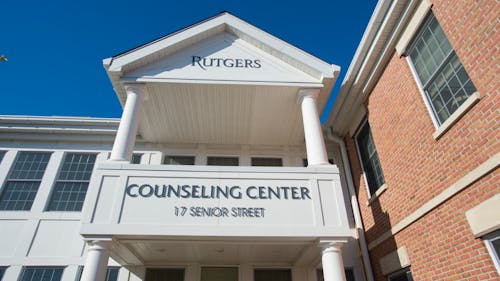COMMENTARY: My mental health or Rutgers' liability?
Commentary

Content warning: suicide
The argument has been made that pain "does not simply resist language but actively destroys it," according to Elaine Scarry's book "The Body in Pain: The Making and Unmaking of the World."
When struggling with depression and anxiety, it does sometimes feel that pain is isolating — drawing a distinct line between those who understand and those who do not.
How can I conceptualize my pain to someone who has never experienced it? It is not that depression or anxiety is indescribable. Depression is crushing loneliness accompanied by harsh thoughts and the struggle to function. Anxiety is doing breathing exercises in class to ward off a panic attack over a seemingly inconsequential mishap. But these descriptions may be meaningless to someone who hasn't experienced those things.
Mental health is scary. It is scary for everyone, but especially for those who do not understand it. But just because it is scary and difficult does not mean we should suppress it and never speak of it — it needs to be de-stigmatized. People need to be able to receive aid and support in ways that will actually help them.
This is where our story begins.
I am still unclear on the details, but a friend reported to a Residence Life official that they were concerned about my mental health following a conversation in which I attempted, probably not so eloquently, to convey what depression means for me.
This set off a chain of bureaucratic motions within the corporation that is Rutgers University.
Proud of myself for taking that step — for trying to explain my feelings and pain — I was not expecting two representatives from Residence Life to knock on my door. Two people that I did not know, that I did not trust, came into my room.
They asked me several questions about my mental health, but the question that really irked me was this: Are you going to kill yourself? I would not be surprised if these people legally had to ask this question, but that does not make it any less invasive, intrusive and counterproductive.
Maybe this question would have saved some people's lives — but I found it triggering. I found the entire situation triggering. I felt I had no agency over the decisions being made about my mental health. It concurrently felt as though I was being punished and interrogated when I had done no wrong.
Eventually, these two people left, but soon enough, they returned! A follow-up, which I am sure is standard procedure, to make sure that in the 90 minutes that had passed, I had not changed my mind about suicide.
These people were still strangers to me — once again invading my room's safe space and asking intrusive, unproductive questions.
Then, I had to talk to Counseling, Alcohol and Other Drug Assistance Program & Psychiatric Services (CAPS) on the phone to answer the same questions for a third time. Yet again, hearing, "are you planning to kill yourself?"
The following day I received an email that I would have yet another meeting with Residence Life.
I can say that despite their intentions, these check-ins worsened my mental health. Though I was not suffering from depression at this time, I felt invaded and helpless. I felt like I was crazy. But most of all, I felt like Rutgers treated me like a liability.
If you have had good experiences with CAPS and Residence Life, I am glad. But I have known many who have attempted to use these resources and been disappointed and subsequently forgotten.
I have the privilege of receiving therapy and psychiatric care independent of Rutgers. If CAPS were the only care I was offered, my life would be entirely different. But this should not be the case.
We should be more than a liability to our school. At a time when mental health is increasingly precarious, more resources should be allocated to ensure that every student receives true care, whatever that means for them.
My point is definitely not that if you are worried about someone in your life, you should do nothing. Instead, you should think deeply about what you are doing before you set off a chain of events that could be more harmful than helpful.
And think twice before you get Rutgers bureaucracy involved…
YOUR VOICE | The Daily Targum welcomes submissions from all readers. Due to space limitations in our print newspaper, letters to the editor must not exceed 500 words. Guest columns and commentaries must be between 700 and 850 words. All authors must include their name, phone number, class year and college affiliation or department to be considered for publication. Please submit via email to oped@dailytargum.com by 4 p.m. to be considered for the following day’s publication. Columns, cartoons and letters do not necessarily reflect the views of the Targum Publishing Company or its staff.



